UN reaffirms support for Bangladesh reform initiatives
Share on:

The United Nations (UN) has acknowledged significant changes in Bangladesh in recent months and reaffirmed its support for the interim government's evolving priorities, particularly in reform commissions focusing on elections, policing, anti-corruption and human rights.
This reassurance was expressed during a joint steering committee (JSC) meeting between the government of Bangladesh and the UN Country Team.
The meeting reviewed progress on the UN Sustainable Development Cooperation Framework (Cooperation Framework) and discussed priorities for 2025.
The meeting, held recently, also addressed critical issues related to the implementation of Sustainable Development Goals (SDGs) and Bangladesh's graduation from Least Developed Country (LDC) status, as stated in an ERD press release.
The Cooperation Framework (2022–2026) outlines UN support for advancing the SDGs across five strategic priorities: inclusive and sustainable economic development, equitable human development and well-being, a sustainable, healthy, and resilient environment, transformative, participatory, and inclusive governance and gender equality and eliminating gender-based violence.
The UN has supported Bangladesh's economic transformation through initiatives such as fostering CMSME development, facilitating financing for SDGs and promoting environmental sustainability.
Significant aid was mobilized in response to Cyclone Remal and widespread flooding, with early warning systems deployed to help millions prepare.
Collaboration with national commissions on reforms in areas such as policing, elections and anti-corruption has continued, alongside support for strengthening legal protections for women and promoting gender equality.
Looking toward 2025, the JSC emphasized integrated policy, financing, and programming at scale to accelerate SDG progress while focusing on the principle of Leaving No One Behind.
Key policies and interventions to support Bangladesh’s development within its evolving political context were also identified.
"Our collective efforts will focus on creating sustainable economic transformation, inclusive basic services, bolstering climate resilience, enhancing governance frameworks, and driving gender equality across all sectors," said Gwyn Lewis, UN Resident Coordinator in Bangladesh.
"We stand ready to support the interim government's reform commissions, assist in accessing innovative financing mechanisms, and strengthen data systems to seize this moment for long-term sustainable development,” Lewis added.
ERD Secretary Md Shahriar Kader Siddiky said: "To graduate from LDC, new horizons of cooperation can be in the fields of science, technology and artificial intelligence."
In addressing SDG priorities within the broader development agenda, participation was expanded to include senior government officials.
The next JSC meeting is scheduled for May 2025.

